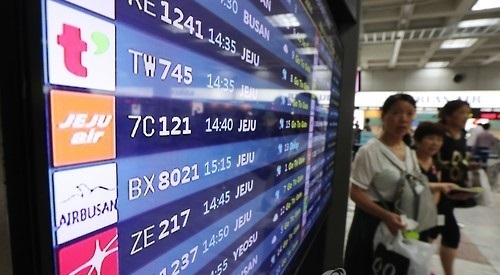South Korean budget carriers are strengthening international routes to Southeast Asia and Japan in a bid to absorb growing low-cost air travel demand and recoup losses stemming from the drop in Chinese passengers amid a diplomatic row over a missile defense system, industry sources said Saturday.
Eastar Jet began services on the Incheon-Da Nang route early this week with a plan to start the Incheon-Sapporo route from July 1.
 |
(Yonhap) |
Jeju Air, another local low-cost carrier, earlier announced a plan to expand its fleet size to 32 jets by the end of the year. The carrier allocated a new plane on Japan and Southeast Asia routes and increased flights to meet growing passenger demand.
"Budget carriers are diversifying their international routes, particularly to Japan and Southeast Asian countries, for summer travel season," said Kim Hyun-jin, an analyst at Shinhan Investment Corp.
The move came amid a steep fall in the number of Chinese tourists to South Korea after Beijing banned the sales of South Korea-bound trips from mid-March in protest of Seoul's deployment of the Terminal High Altitude Area Defense battery on its soil. The number of inbound Chinese visitors in April dropped 66.6 percent compared to the same period last year, according to the Korea Tourism Organization.
South Korea also saw the number of Japanese tourists fall 5.4 percent on-year in April, due largely to intensifying geographical instability on the Korean Peninsula in the face of evolving nuclear and missile threats from North Korea, although the comparable figure for the January-March period rose a sharp 22 percent on-year.
The number of South Korean tourists to Japan also jumped more than 20 percent in the first three months of the year from the same period in 2016.
The tally on Taiwanese visitors gained 14.5 percent on-year to 79,203 in April on the back of robust demand for trips to South Korea during the spring.
In 2016, the country's six budget carriers -- Jin Air, Jeju Air, Air Busan Co., Air Seoul Inc., Eastar Jet and T'way Air Co. -- transported 19.6 percent of passengers traveling abroad. The figures were up from 14.6 percent a year earlier, according to the transport ministry. (Yonhap)








